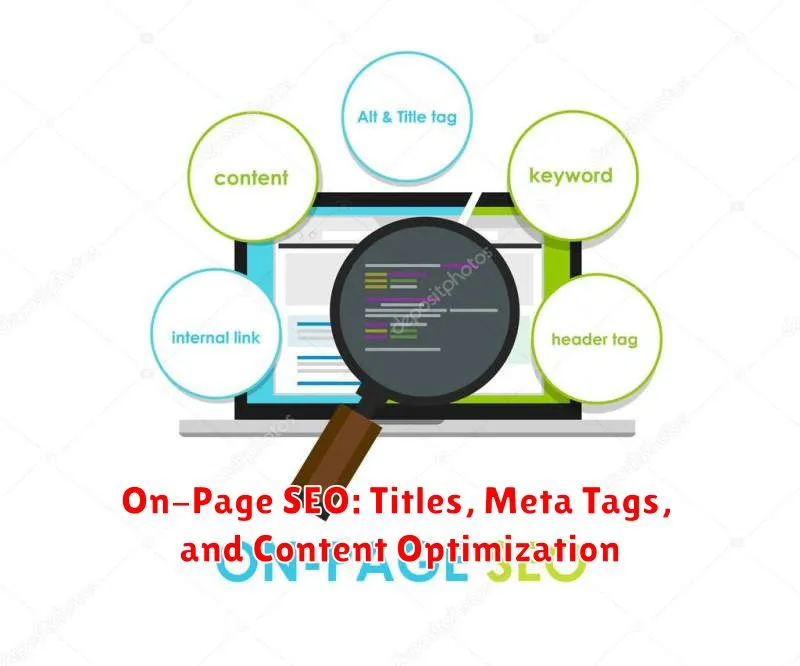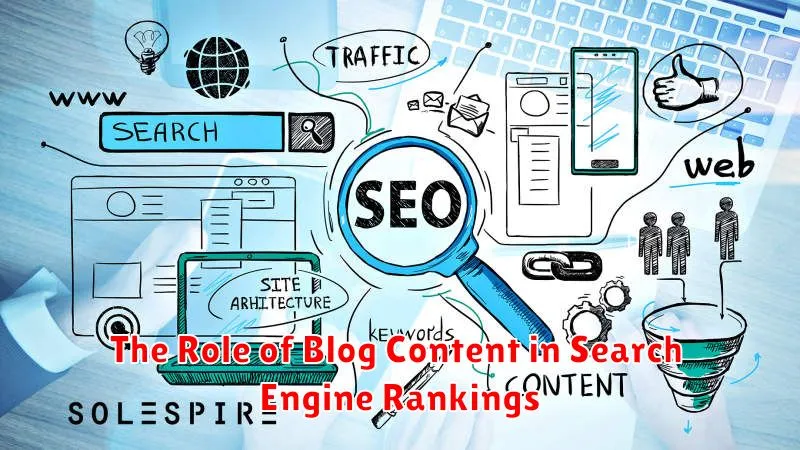Are you struggling to attract organic traffic to your online business? Effective SEO (Search Engine Optimization) is crucial for driving targeted traffic and boosting your online visibility. This article will explore proven SEO strategies to help you increase your website’s ranking in search engine results pages (SERPs), ultimately generating more leads and sales. Learn how to master keyword research, on-page optimization, and off-page SEO techniques to significantly improve your website traffic and achieve your business goals.
What is SEO and Why It Matters for Online Business

Search Engine Optimization (SEO) is the practice of increasing the quantity and quality of traffic to your website through organic search engine results. In simpler terms, it’s about making your website easily findable on Google and other search engines.
SEO matters significantly for online businesses because it’s a cost-effective way to attract targeted customers. Unlike paid advertising, which requires continuous spending, SEO builds organic visibility over time. Higher rankings in search results mean more visibility, leading to increased brand awareness, website traffic, and ultimately, more sales. Ignoring SEO means missing out on a large potential audience searching for products or services you offer.
Effective SEO involves optimizing various aspects of your website, including content, technical structure, and backlinks. By focusing on relevant keywords and providing high-quality, user-friendly content, businesses can significantly improve their search engine rankings and achieve sustainable online growth.
Keyword Research to Target the Right Audience
Effective keyword research is crucial for driving targeted traffic to your online business. It involves identifying the terms and phrases your potential customers use when searching for products or services like yours.
By understanding your target audience‘s search behavior, you can optimize your website content and improve your search engine rankings. This ensures that your website appears in search results when people are actively looking for what you offer.
Tools like Google Keyword Planner, SEMrush, and Ahrefs can help you discover relevant keywords with high search volume and low competition. Analyzing these keywords allows you to focus your efforts on terms most likely to attract your ideal customers.
Remember to consider long-tail keywords – longer, more specific phrases – as they often have less competition and higher conversion rates. For example, instead of targeting just “shoes,” consider phrases like “women’s running shoes size 8.” This level of specificity helps attract highly qualified leads.
Consistent keyword implementation across your website, including your website copy, meta descriptions, and image alt text, is key to maximizing the effectiveness of your research. Don’t stuff keywords artificially; focus on natural, user-friendly language that incorporates your chosen keywords seamlessly.
On-Page SEO: Titles, Meta Tags, and Content Optimization

On-page SEO focuses on optimizing elements within your website to improve search engine rankings. This includes carefully crafting titles and meta descriptions.
Titles should be concise, compelling, and include relevant keywords. They are crucial for attracting clicks from search engine results pages (SERPs). Meta descriptions, while not directly impacting ranking, are vital for encouraging users to click through from the SERPs. They should accurately reflect the page’s content and entice readers.
Content optimization is paramount. High-quality, relevant content that addresses user search intent is key. This means using keywords naturally throughout the text, focusing on providing value to the reader, and ensuring easy readability with proper headings, subheadings, and formatting. Internal linking to other relevant pages on your site can also boost SEO and user experience.
By meticulously optimizing these on-page elements, you significantly enhance your website’s visibility and attract more organic traffic.
Off-Page SEO and Link Building Strategies
Off-page SEO focuses on building your website’s authority and reputation outside of your website itself. A key component of this is link building.
Link building involves acquiring backlinks from other reputable websites. These backlinks act as “votes of confidence,” signaling to search engines that your website is a trustworthy and valuable resource. The more high-quality backlinks you have, the higher your website will rank in search engine results pages (SERPs).
Effective strategies for link building include guest blogging on relevant websites, creating high-quality content that naturally attracts links, participating in online communities and forums, and reaching out to influencers and websites in your industry.
Beyond link building, other off-page SEO strategies involve building brand awareness through social media engagement, online public relations, and directory submissions. These activities help establish your brand’s presence and credibility online, indirectly benefiting your search engine rankings.
Careful consideration should be given to the quality of backlinks. Low-quality or spammy links can actually harm your website’s ranking. Prioritize backlinks from reputable and relevant websites that align with your industry and target audience.
By implementing a comprehensive off-page SEO and link building strategy, you can significantly improve your website’s visibility, drive more organic traffic, and ultimately boost your online business’s success.
How to Improve Website Speed and Mobile Friendliness
Website speed and mobile-friendliness are crucial for SEO and user experience. A slow-loading website leads to high bounce rates and poor rankings in search results. To improve speed, optimize images, leverage browser caching, and utilize a content delivery network (CDN).
Mobile-friendliness is essential because a significant portion of internet traffic originates from mobile devices. Ensure your website is responsive by using a mobile-first design approach or responsive design frameworks. Test your site’s mobile performance using Google’s Mobile-Friendly Test.
Improving both speed and mobile-friendliness will positively impact your search engine rankings, user engagement, and ultimately, drive more traffic to your online business. Regularly monitor your website’s performance using tools like Google PageSpeed Insights to identify areas for improvement.
The Role of Blog Content in Search Engine Rankings

Blog content plays a crucial role in improving your search engine rankings. Search engines like Google prioritize websites that consistently provide fresh, high-quality, and relevant content. Regular blog posts demonstrate to search engines that your website is actively maintained and updated, a key factor in ranking algorithms.
Keywords are vital. By strategically incorporating relevant keywords into your blog posts’ titles, headings, and body text, you increase the chances of your content appearing in search results for those specific terms. This targeted approach drives organic traffic to your website.
High-quality content is essential. Well-written, informative, and engaging blog posts keep visitors on your site longer. Increased dwell time is a positive ranking signal, indicating to search engines that your content is valuable and relevant to user searches.
Backlinks also play a significant role. When other reputable websites link to your blog posts, it boosts your website’s authority and trustworthiness in the eyes of search engines, leading to improved rankings.
In summary, a well-executed blogging strategy, incorporating relevant keywords, high-quality writing, and a focus on user experience, is a powerful tool for enhancing your search engine optimization (SEO) efforts and driving more traffic to your online business.
Using Tools Like Google Search Console and Ahrefs
Google Search Console (GSC) provides invaluable insights into how Google views your website. It shows which keywords drive traffic, identifies technical issues impacting your rankings, and allows you to submit sitemaps for faster indexing. Using GSC effectively is crucial for understanding your website’s performance and identifying areas for improvement.
Ahrefs, a premium SEO tool, offers a more comprehensive analysis of your website and your competitors. It provides data on keyword rankings, backlink profiles, organic search traffic estimates, and content gap analysis. This allows for a more strategic approach to SEO, enabling you to identify opportunities to outrank competitors and improve your overall search visibility.
By utilizing both GSC and Ahrefs (or similar tools), you gain a holistic view of your website’s SEO performance. GSC provides the technical foundation while Ahrefs offers competitive intelligence and strategic planning capabilities, ultimately leading to a more effective SEO strategy and increased organic traffic.
Tracking SEO Results and Making Adjustments
Tracking your SEO performance is crucial for understanding what’s working and what’s not. Key metrics to monitor include organic search traffic, keyword rankings, backlinks, and website bounce rate. Utilize tools like Google Analytics and Google Search Console for comprehensive data.
Analyzing this data allows you to identify trends and patterns. Are specific keywords driving significant traffic? Is your bounce rate high, suggesting content improvements are needed? This analysis informs strategic adjustments.
Based on your findings, implement necessary changes. This could involve optimizing existing content for better keyword targeting, creating new content around high-performing keywords, or building high-quality backlinks from reputable websites. Regularly review and refine your SEO strategy based on ongoing performance data.
Remember that SEO is an iterative process. Consistent monitoring and adjustment are key to achieving sustainable growth in organic traffic and ultimately, driving more business to your online presence. Don’t be afraid to experiment and adapt your approach as needed.

